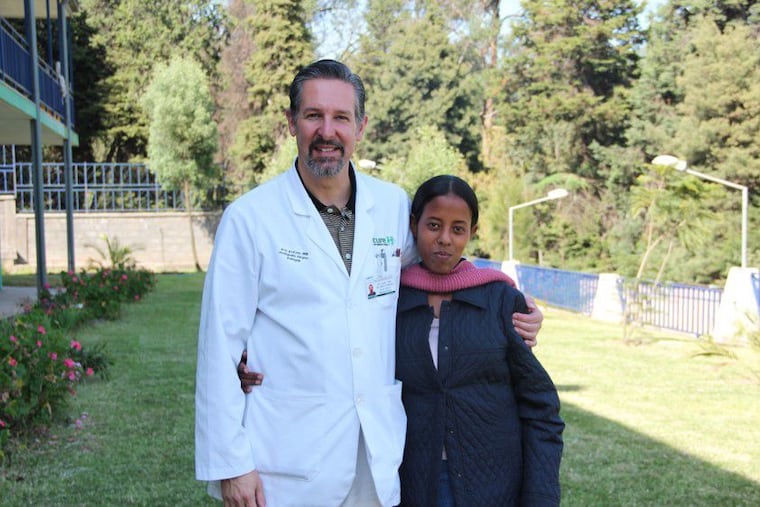State award-winning volunteer surgeon humbled by being able to help Africa’s children
Humble surgeon hopes to inspire others to also change lives.

Early in Eric Gokcen’s tenure as medical director of a new hospital in Ethiopia, the orthopedic surgeon — his other post at the hospital — was operating on a child with clubfoot. He’d go on to perform thousands of the one-hour procedure — the only way many youngsters could hope to walk without crutches, go to school, work, or marry. Few other surgeons in that impoverished nation were available to do it.
But Gokcen wasn’t thinking about himself, just the task at hand, until a visiting medical student piped up.
One hour of your time just changed this kid’s entire life, the student said.
Someone else might have felt a flash of pride. Not Gokcen.
“It was really humbling,” the doctor said, “to see myself being used to make such a difference in people’s lives.”
Because of his dedication to healing and his devotion to improving the lives of children in developing nations, Gokcen, 58, has been named recipient of the Pennsylvania Medical Society’s Physician Award for International Voluntary Service.
The Pennsylvania Medical Society “had more than a dozen deserving candidates for this award from all across Pennsylvania,” said Michael Della Vecchia, the medical society’s president-elect.
“Dr. Gokcen stood out for all his many years of dedication to serving children with disabilities, and for sharing that passion with the next generation of physicians through mission trips,” said Della Vecchia. “We’re proud to have a colleague like Dr. Gokcen in Philadelphia.”
Gokcen devoted seven years of his career in Kenya and Ethiopia working to improve the lives of the poor, performing thousands of life-changing surgeries on children with disabilities.
While there, Gokcen also started two internationally accredited orthopedic surgery residency programs to help address the critical shortage of those medical professionals in those nations. He was honored by the Ethiopian Parliament.
Now back in the United States, Gokcen is an associate professor of orthopedic surgery and sports medicine at Temple University, where he is using his foot and ankle expertise to research best treatment outcomes for gunshot victims.
He is also director of Temple’s global orthopedic surgery program, which he started and which brings medical residents to developing countries. It is currently on pause due to COVID-19.
Joshua Luginbuhl, a Temple orthopedic resident, traveled to Kenya with Gokcen in the program last fall.
“Going on that trip was very valuable and eye-opening and rewarding, and it’s definitely something I can see myself doing in the future,” Luginbuhl said.
Through the program, the resident got see firsthand how patients would travel long distances to see the visiting doctors, so limited is their access to surgical care.
“I think what makes Dr. Gokcen such a great mentor is he’s trying to get us exposure to different cultures through orthopedics,” Luginbuhl said. “It’s unique.”
Gokcen hopes to motivate others to carry on the much-needed service to people in the developing world. His own move to international work came gradually.
The son of immigrant parents — a German mother and a father from Turkey — Gokcen was raised in central New Jersey, went to medical school at Jefferson, and moved to Bucks County when he began private practice.
He had been interested in working in developing parts of the world for quite a while and eventually got to do some short-term foreign service trips on his own time, including one with an organization called Cure International. After 12 years in private practice, Gokcen and his wife, Corinne, decided to accept a two-year post with Cure in Kenya. That was followed by one in Ethiopia, opening a new hospital for Cure and serving as the facility’s orthopedic surgeon.
The Gokcens’ life wasn’t easy — frequent power outages, sparse communication, missed family events back home — but the rewards were many.
“My wife and I have frequently said that from living in Africa, our bank account may have gone down and made us poorer, but we were exponentially richer because of our experience there,” said Gokcen, a Christian whose faith has guided him in his medical practice.
His wife is not a doctor, but he said she’d look for patients in need of his help and refer them to the hospital. While in Ethiopia, she became conversational in the language so she could better reach out to the community. She’d find children whose families probably never would’ve known how to seek help.
“The most rewarding aspect of my time in Africa was being able to see children’s lives transformed by the surgeries and care they received at our hospital,” said Gokcen.
In some villages, a deformity would be seen as the result of a curse on a family. To correct the deformity, therefore, could create a life change for the patient’s entire family. From there, Gokcen said, his team would try to educate the villagers.
One of Gokcen’s most challenging cases was an Ethiopian teenager named Workitu, who was born with a rare deformity called Parasitic Twin. She had two extra nonfunctional legs and arms, like a partial Siamese twin. Workitu had left school at a young age and spent most of her life hidden. After extensive surgery with Gokcen’s team, she ultimately was able to return to school, and would even be able to have children later in her life, if she chose. (Her recovery was part of a Discovery Channel documentary.) Gokcen’s team was awarded a Certificate of Honor by the Ethiopian Parliament for his work.
Gokcen is now considered an expert on international medical education in the developing world. Motivated by the need he witnessed during his time in Africa, he hopes to help others carry on that much needed work.
“Even now as I think about it, I am overwhelmed with a sense of gratitude to have been able to impact these children in such a profound way,” said Gokcen, “and I’m motivated to continue to do what I do.”